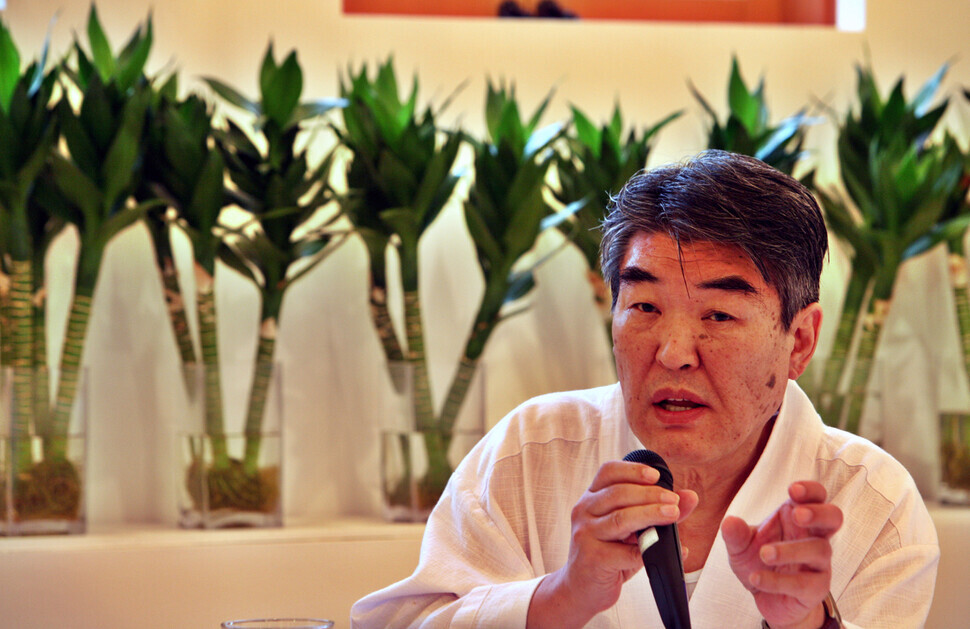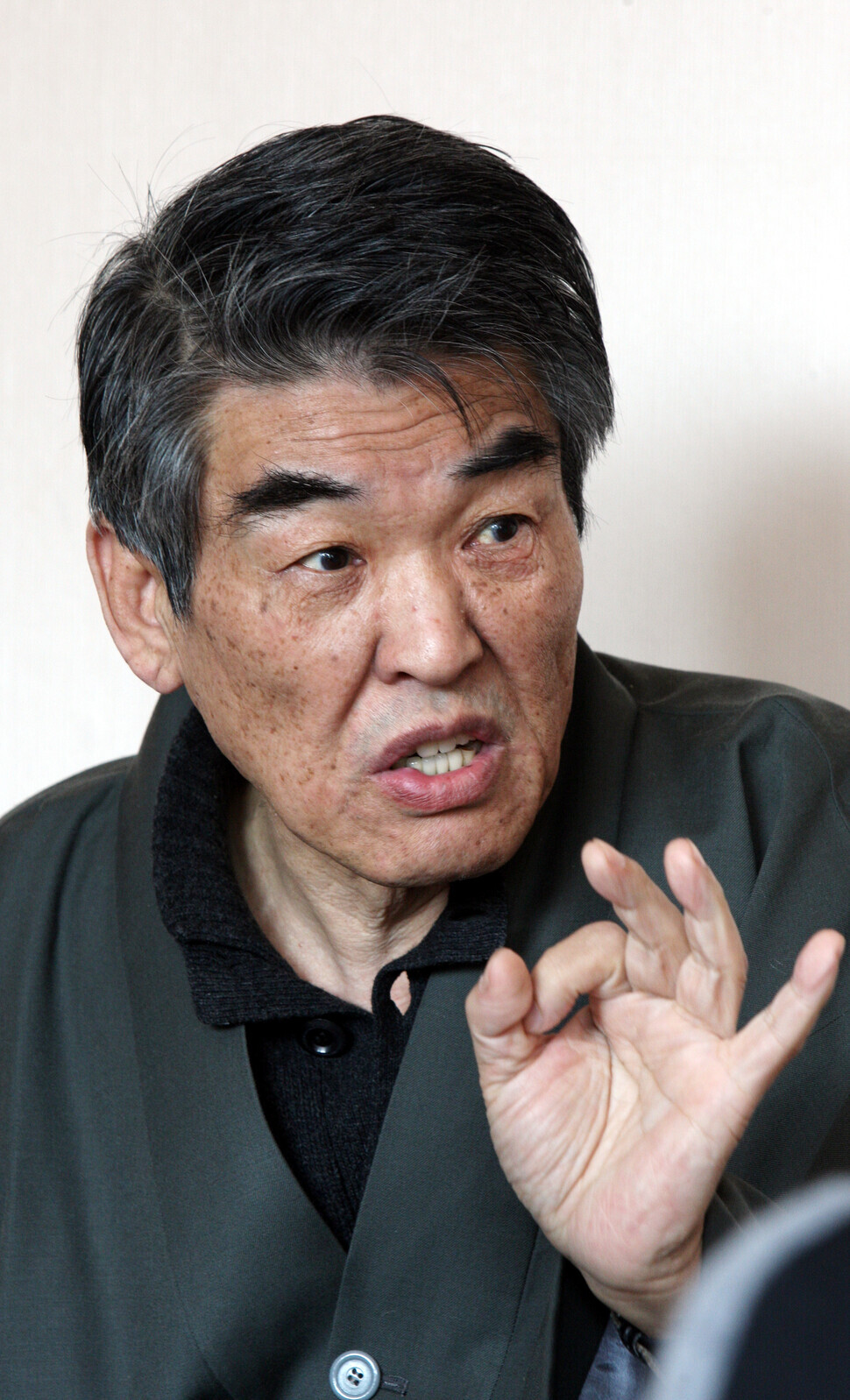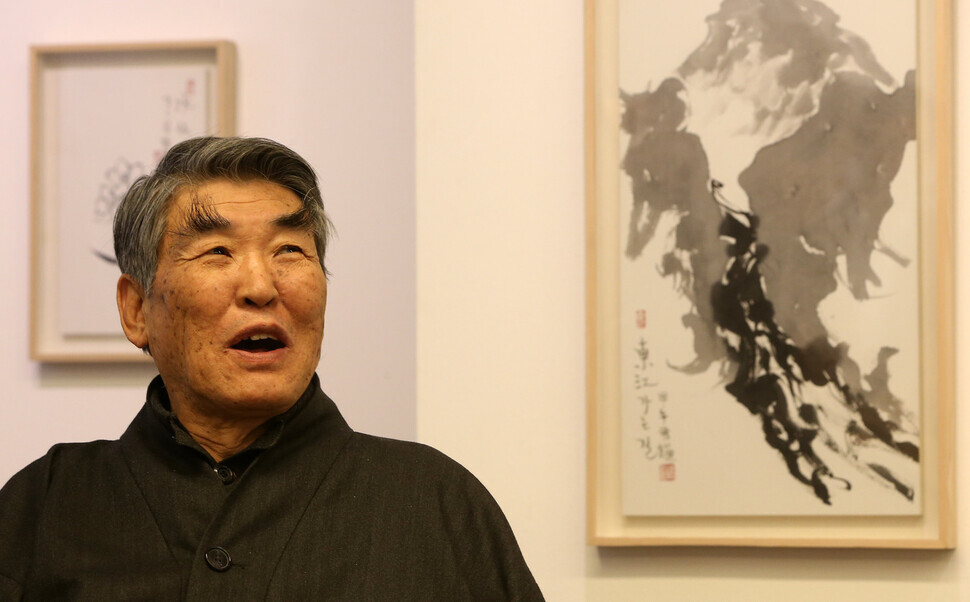hankyoreh
Links to other country sites 다른 나라 사이트 링크
S. Korean dissident poet Kim Chi-ha dies at 81

Poet Kim Chi-ha, author of such poems as “With a Burning Thirst” and “Five Bandits,” passed away on Sunday. He was 81 years old.
Kim died at his home in Wonju, Gangwon Province, following a year-long battle with an undisclosed illness, a source from the Toji Cultural Foundation said.
Kim was an activist for whom the violence and tribulations of Korea’s contemporary history were inscribed on his body. He was also a thinker who propounded a groundbreaking “life ideology” based on a modern reinterpretation of traditional thought.
While Kim had spent seven years in prison as a dissident against the dictatorship, he later wrote a column for the Chosun Ilbo castigating young students for setting themselves on fire during the democratization struggle in 1991. When he declared his support for Saenuri Party candidate Park Geun-hye — daughter of Park Chung-hee, the very dictator who had oppressed him — in the 2012 presidential election, he was accused of being a turncoat.
Kim was born in Mokpo, South Jeolla Province, in 1941, under the name Kim Yeong-il. After moving to Wonju in 1954, he graduated from Wonju Middle School and then studied at Joongdong High School in Seoul, eventually gaining admittance to the aesthetics department at Seoul National University in 1959.
As an activist, Kim wrote a eulogy for a “funeral for national democracy” at the Seoul College of Liberal Arts and Sciences, as part of the opposition to what was perceived as the Korean government’s craven capitulation to the Japanese in 1964. Such activities led to Kim’s arrest and a four-month prison stay for the activist.
Following his graduation from university in 1966, Kim managed in 1969 to publish four poems, including “Streets of Seoul,” under the pen name Kim Chi-ha in the poetry journal Poet (Siin), which was edited by Cho Tae-il. That marked Kim’s official debut as a writer.

Just one year after his debut, Kim published “Five Bandits,” a caustic denunciation of corruption among the powerful that was set to the rhythms of pansori, in the May 1970 issue of World of Thought (Sasangkye). After the poem was printed in full in Democratic Front Line, the official organ of the opposition New Democratic Party, the authoritarian regime of Park Chung-hee took notice, describing the poem as being “sympathetic to the propaganda activity of the ‘North Korean puppet regime.’” Kim was taken into custody for violating the Anti-Communism Law, and the publisher and editor of World of Thought and the editor of Democratic Front Line were detained as well.
When the incident came to the attention of the National Assembly, Kim was released on bail after a month behind bars. But the whole incident had brought him to global prominence.
Kim had begun writing poetry while in high school and had published his poetry for the first time in Mokpo Literature in 1963, before his official debut. At the end of 1970, in the year following his debut, he published his first volume of poetry, called “The Yellow Earth,” which howled with vivid, bloody lyricism.
After being linked to the National League of Democratic Youth and Students in 1974, Kim was arrested that April and sentenced to death for inciting a rebellion by an emergency military tribunal. But his sentence was later commuted to life in prison.
Around the time prosecutors asked for the death sentence, a campaign began in Japan to save Kim’s life. That later expanded into an international movement, with such intellectuals as Jean-Paul Sartre, Simone de Beauvoir and Noam Chomsky signing a petition for Kim’s release. On Feb. 15, 1975, Kim received a stay of execution of his sentence and was released after about 10 months in prison.
Upon his release, Kim said, “It’s strange to be out so soon after having been given a life sentence. Either the times are crazy, I’m crazy, or both.”
Just 10 days after being released, Kim ran a series of three articles in the Dong-a Ilbo newspaper from Feb. 25 through Feb. 27 in which he argued that the People's Revolutionary Party Incident had been fabricated. That prompted the authorities to arrest him once again and sentence him to seven years in prison and suspend his qualifications for seven years, along with resuming his earlier life sentence.
Kim spent the rest of the 1970s in prison and was not released until being given a stay of execution in December 1980, after Chun Doo-hwan became president. It was while Kim was in prison that he opened his eyes to his life ideology.
While Kim was in prison, the Afro-Asian Writers' Association decided to award him the Lotus Prize for Literature, which was considered a Nobel Prize for the Third World.
Kim’s second volume of poetry, called “With a Burning Thirst,” was published in 1982, along with the first volume of “South: An Epic Tale,” but sales of both books were promptly banned.
The life ideology that Kim began to reveal in “South: An Epic Tale” continued in his story collection “Rice” and his essay collection “Boat Songs from the Southern Land.”
In 1986, Kim released the first and second volumes of his poetry collection “Aerin,” which combined folk lyricism with his life ideology. Then in 1988, he published the long poem “Rain Cloud in Days of Drought,” which dealt with the life and death of Choe Je-u, the 19th-century founder of the Donghak Movement.

The death of Kang Gyeong-dae, a student at Myongji University, under the truncheons of riot police in 1991 prompted a number of students and other young people to protest by killing themselves, either by jumping off buildings or setting themselves on fire. But Kim put a damper on their passion with a long column in the Chosun Ilbo titled, “Sweep Away the Rituals of Death.”
This led to antagonism between him and members of the democratization movement that had been like a second home to him. The turbulence also included his expulsion from the Association of Writers for National Literature (now the Writers’ Association of Korea), which had emerged out of his “rescue movement” activities.
Kim would go on to proclaim national ideas in numerous prose collections, including the ideas of “yullyeo” (rhythm of the universe) and “later world transformation.”
Launching one-person demonstrations against a memorial to former President Park Chung-hee in 2001, he made efforts to reestablish himself, including reconciliations with younger writers from the Writers’ Association of Korea.
But his declaration of support for Park Geun-hye ahead of the 2012 presidential election was a step from which there would be no coming back. He completed his “turncoat” transformation with remarks made after the election, where he collectively denounced members of the democratization movement and singled out former colleagues from the literary world and democratization struggle by name in invective that bordered on abusive.
Tackling the iron-fisted rule of the Park Chung-hee dictatorship, the poet Kim Chi-ha turned the 1960s and 1970s into an era of confrontation between two men: himself and Park. Yet he would end his life without ever having the opportunity to make amends for the bizarre missteps of his later life, which was marred by his defense of and support for that same dictator’s incompetent and corrupt daughter.
Kim is survived by his oldest son, writer Kim Won-bo, and his second son, Toji Cultural Foundation Chairperson and Toji Cultural Center Director Kim Se-hee. His wake will be held at Wonju Severance Christian Hospital.
By Choi Jae-bong, literature correspondent
Please direct questions or comments to [english@hani.co.kr]

Editorial・opinion
![[Column] Has Korea, too, crossed the Rubicon on China? [Column] Has Korea, too, crossed the Rubicon on China?](https://flexible.img.hani.co.kr/flexible/normal/500/300/imgdb/original/2024/0419/9317135153409185.jpg) [Column] Has Korea, too, crossed the Rubicon on China?
[Column] Has Korea, too, crossed the Rubicon on China?![[Correspondent’s column] In Japan’s alliance with US, echoes of its past alliances with UK [Correspondent’s column] In Japan’s alliance with US, echoes of its past alliances with UK](https://flexible.img.hani.co.kr/flexible/normal/500/300/imgdb/original/2024/0419/2317135166563519.jpg) [Correspondent’s column] In Japan’s alliance with US, echoes of its past alliances with UK
[Correspondent’s column] In Japan’s alliance with US, echoes of its past alliances with UK- [Editorial] Does Yoon think the Korean public is wrong?
- [Editorial] As it bolsters its alliance with US, Japan must be accountable for past
- [Guest essay] Amending the Constitution is Yoon’s key to leaving office in public’s good graces
- [Editorial] 10 years on, lessons of Sewol tragedy must never be forgotten
- [Column] A death blow to Korea’s prosecutor politics
- [Correspondent’s column] The US and the end of Japanese pacifism
- [Guest essay] How Korea turned its trainee doctors into monsters
- [Guest essay] As someone who helped forge Seoul-Moscow ties, their status today troubles me
Most viewed articles
- 1[Column] The clock is ticking for Korea’s first lady
- 2After 2 months of delayed, denied medical care, Koreans worry worst may be yet to come
- 3[Column] Has Korea, too, crossed the Rubicon on China?
- 4US overtakes China as Korea’s top export market, prompting trade sanction jitters
- 5[Correspondent’s column] In Japan’s alliance with US, echoes of its past alliances with UK
- 6[Editorial] When the choice is kids or career, Korea will never overcome birth rate woes
- 7Hong Se-hwa, voice for tolerance whose memoir of exile touched a chord, dies at 76
- 8All eyes on Xiaomi after it pulls off EV that Apple couldn’t
- 9More South Koreans, particularly the young, are leaving their religions
- 10John Linton, descendant of US missionaries and naturalized Korean citizen, to lead PPP’s reform effo